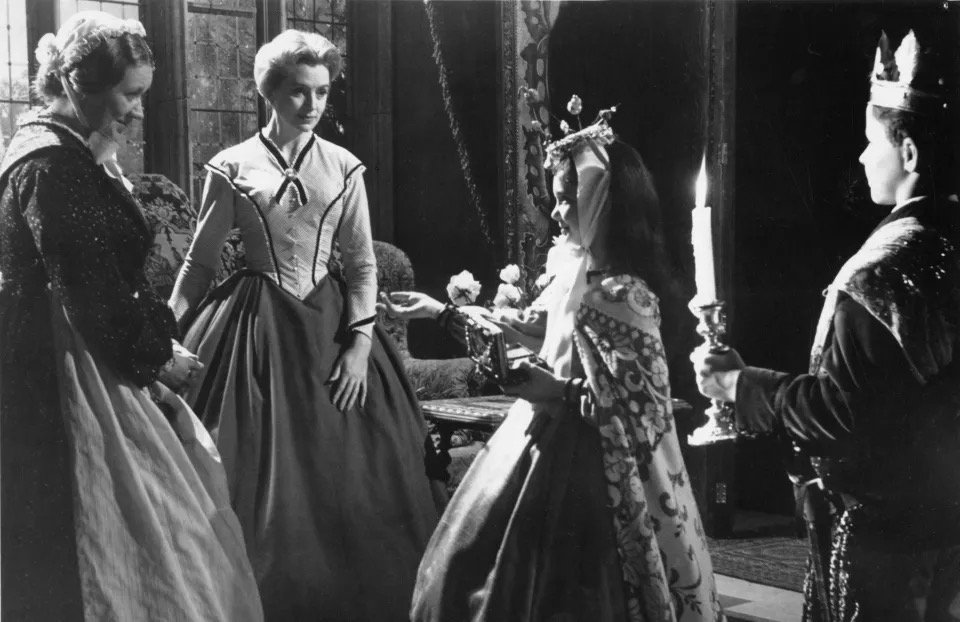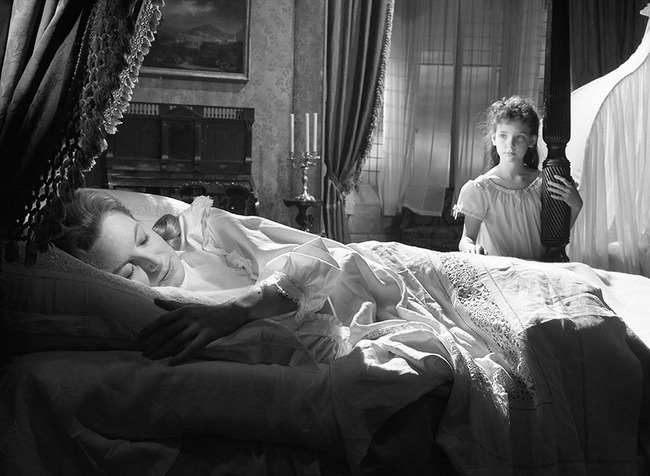‘The Innocents’ Is a Top-Tier Supernatural Chiller [The Overlooked Motel]

Welcome to The Overlooked Motel, a place where under-seen and unappreciated films get their moment in the spotlight. I hope you enjoy your stay here and find the accommodations to be suitable. Now, please take a seat and make yourself comfortable. I have some misbehaving guests to ‘correct.’
Watch the latest episode:
There are few things I enjoy more than discovering a cinematic diamond in the rough and sharing my discovery with like-minded friends. That’s precisely why I started The Overlooked Motel. Well, I have a recent discovery that I’m very pleased to be championing today. This is a film I wish I hadn’t slept on. I’ve owned a copy of the DVD for years but didn’t get around to watching it until very recently. The good news is that I fell in love immediately. The bad news is that it has taken me this long to experience said film. I am talking about the tragically under-seen black-and-white chiller The Innocents.
This Gothic, supernatural horror film is based on the Henry James novella The Turn of the Screw. Director Jack Clayton brings the source material to life in grandiose fashion. The entire ordeal is cloaked in atmospheric tension. Additionally, The Innocents features committed performances from a talented cast and breathtaking cinematography you’ll have to see to believe.
The Setup for The Innocents Goes Like This:
The film catches up with Miss Giddens (Deborah Kerr), a young woman who accepts a position as a governess for a notorious playboy who has inherited a niece and nephew for whom he doesn’t have the time of day. The detached uncle is a guardian in name only to young Flora (Pamela Franklin) and Miles (Martin Stephens). So he expects Miss Giddens to be a surrogate parental figure for both of her charges. Miss Giddens hesitantly accepts the challenge and goes to work bonding with the youngsters immediately. She initially thought the assignment would be an enjoyable one. But when the children begin demonstrating erratic and mysterious behavior, she begins to wonder if supernatural forces may be at play. The evil she eventually uncovers will shock and terrify her to her very core.
Screenwriters William Archibald and Truman Capote masterfully update the source material for the big screen. The Innocents takes the slow-burn approach to tension-building. The intensity begins gradually but escalates exponentially in the third act. Each passing sequence is more intense than that by which it was preceded.

The tension levels are nicely complimented by beautiful black-and-white cinematography that captures every single detail. It’s crisp and nuanced. Some of that likely has to do with the film’s vintage. By the ‘60s, filmmaking technology had evolved and improved dramatically from the early days of cinema. You can see far more detail in this film than in many full-color color offerings of the same era. Aside from advances in black-and-white filmmaking, The Innocents also benefits from the prowess of a skilled director of photography. Freddie Francis frames and lights the shots masterfully. The world depicted within looks so realistic and inviting that it almost feels like you could climb inside your television. That’s no small feat without the benefit of a more dynamic color palette.
The Impact of Isolation in The Innocents
Cinematography aside, the narrative immediately establishes Miss Giddens (Deborah Kerr) as isolated from the outside world without a lifeline. The children’s uncle (Michael Redgrave) has no qualms about admitting he wants nothing to do with them and doesn’t care to be bothered, even in a life-or-death emergency. His cold persona serves a couple of important functions. It works to endear the viewer to Miss Giddens as a compassionate caregiver who wants nothing more than to make her charges feel safe, loved, and valued. Their uncle’s aloof detachment also enhances the isolation aspect of the narrative. Miss Giddens and the children are already far removed from the hustle and bustle of the city with limited resources. Taking away the option to call for help only amplifies that.
Deborah Kerr delivers a committed performance here. Miss Giddens’ adoration for her charges is apparent immediately. She’s warm, engaging, and provides a sense of safety for the children. However, that sense of safety is short-lived.
Miss Giddens’ arrival has the potential to lure the viewer into a false sense of security which is eventually upended when the supernatural angle comes into full focus. Though the central evil takes its time to show itself, the buildup is almost as enjoyable as the payoff. The characters are well-developed and accessible. I found myself coming to care deeply about each of them, which serves to add an additional measure of intensity to some of the third-act narrative developments. I’ll stop there to avoid any spoilers. But rest assured that the proceedings get plenty dark. Screenwriters Archibald and Capote pull no punches.
Precocious Youngsters Add an Element of Terror to the Experience
Pamela Franklin and Martin Stephens work to complement Kerr’s screen presence. A lot of child actors struggle to turn in an immersive performance. Hell, a lot of adult actors have a hard time reaching that level. But there are no weak showings here. The youthful leads are fully committed and competent in their craft, making the misfortunes each endures all the more gut-wrenching.
Not surprisingly, both had a successful run making genre pictures. Franklin went on to star in chillers like The Legend of Hell House and Satan’s School for Girls. And Stephens appeared in the original Village of the Damned and 1966’s The Witches.

The Consensus?
The Innocents is atmospheric, beautifully lensed, and features strong showings from the three key players. Don’t make the mistake I did. Do not sleep on this hidden gem.
If you have plans to seek The Innocents out, you can find this chilling classic available as a digital rental via most major platforms. Additionally, Criterion has put out a crisp transfer of The Innocents on disc. I’m a die-hard physical media champion. So, it’s easy to guess which option I’d recommend.
That’s all for this installment of The Overlooked Motel. If you want to chat more about under-seen and underrated films, feel free to hit me up with your thoughts on Twitter, Threads, or Instagram.
Categorized:Editorials The Overlook Motel

